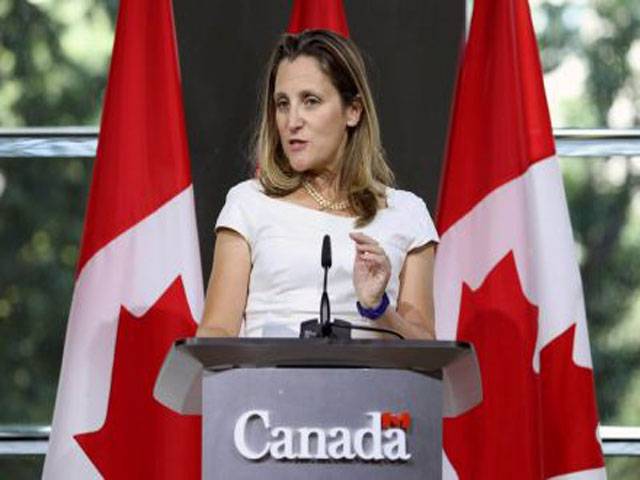WASHINGTON - Two days of high-level talks ended Thursday and the United States and Canada did not appear to be close to a deal to renew the three-nation North American Free Trade Agreement.
Canada's Foreign Minister Chrystia Freeland told reporters negotiations had been "continuous" and "constructive" but in contrast to previous encounters over the past month she refrained from saying the sides had made progress.
"I chose my words carefully. Today we discussed some tough issues. The conversation was constructive. We all continue to work very hard," Freeland said after two meetings with US Trade Representative Robert Lighthizer.
Officials have been in talks nearly non-stop for a month as they try to overcome hurdles and agree on a NAFTA rewrite, under pressure from US President Donald Trump to sign onto a deal reached in August with Mexico.
But Canadian Prime Minister Justin Trudeau has resisted the US push and made it clear he will not accept just any deal. He said on Wednesday he was confident an agreement was possible "but it will take more work."
Freeland was due to return to Canada for a summit of 17 women foreign ministers and next week she is expected to attend the United Nations General Assembly in New York, meaning it is unclear when in-person NAFTA negotiations might resume.
Last month, however, she cut short a European trip to return to Washington.
US President Donald Trump, who called NAFTA "one of the worst trade deals in history," demanded the 1994 accord be revised and the talks started a year ago.
The United States and Mexico sealed their own deal at the end of August, after reaching agreement on auto content requirements and intend to sign the accord by December 1, when Mexican President-elect Andres Manuel Lopez Obrador takes office.
Ottawa and Washington remain at odds over Canada's managed dairy sector, and the dispute resolution provisions in NAFTA. Trudeau said Canada will continue to defend supply management in the dairy industry. Jerry Dias, head of Canada's main private sector trade union Unifor, was also in Washington but said Ottawa could not agree to a deal while Trump continued to threaten punitive tariffs on autos and kept tariffs on softwood lumber, steel and aluminum.
"I think that Canada was delaying the deal until Donald Trump had an element of common sense enter into his mind," Dias said. "We're frankly just waiting for the US team to show some flexibility, to show that they wanted a deal."
"Here we're talking about a trade agreement between our two nations but one of the parties reserves the right to jerk around with your economy at any given time," he said of the US tariffs. "Not a chance."
Meanwhile, Canadians paid 2.8 percent more for goods and services in August than a year earlier, with prices rising across the board, official data released Friday showed.
Inflation was only a tick higher than analysts had forecast, after the consumer price index soared to 3.0 percent the previous month.
Statistics Canada said the price of gasoline -- the main contributor -- was up nearly 20 percent year over year.
Water, electricity and other fuels, as well as travel tours and airline tickets, and passenger vehicles also cost more in the month, the government statistical agency said.
But most prices rose at a slower pace than in July.
Economists expect the Bank of Canada to hike its key lending rate in October in order to temper inflation as the economy hovers at near capacity.
But the central bank has wavered due to uncertainty over the future of a crucial continental trade pact with the United States and Mexico.
The bank increased interest rates in July by 25 basis points, after a previous hike in January -- bringing rates to the highest level in a decade.
"While (the economic data) is not screaming for rate hikes, it gives the bank comfort to hike in October even if GDP growth slows a little from Q2's pace," commented CIBC Economics analyst Andrew Grantham in a research note.






